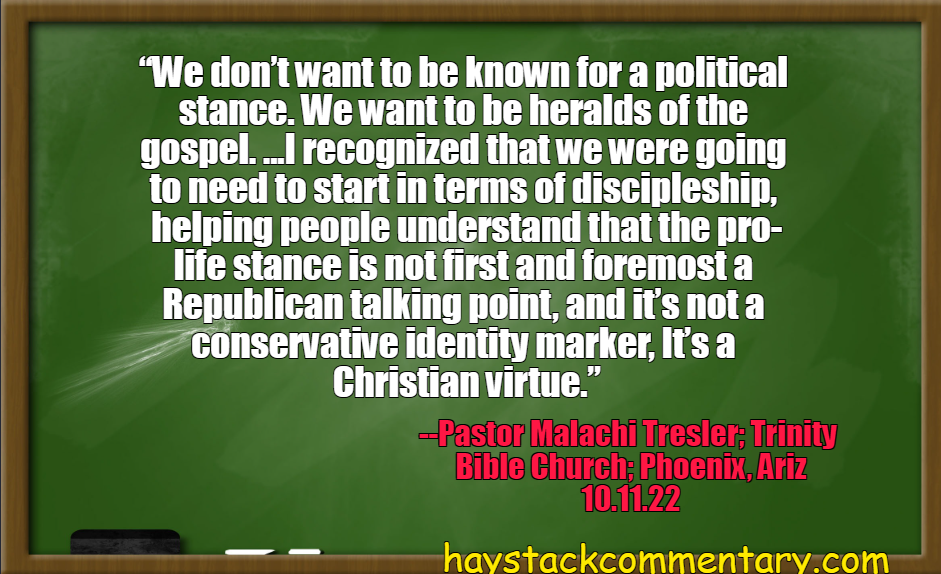 RC Sproul
RC Sproul
Any Christian should agree that the civil law of any nation ought to be the civil law that God commands. The question is, does God want the law He gave to Israel to be that law? If our only other option were legal chaos, man’s law, autonomy, then of course He must want us to adopt Israel’s law. What if though, there were another law of God? What if we can at least begin to discern that law which God intended for all nations everywhere? What if said law were more clear than the quicksilver law we call natural law? God gave Moses His law for Israel, His set apart people. God gave His law for all people to those who represented all people, Adam and Noah. The laws God gave them we can rightly call “creation” law. I would argue that civil government itself is established when Noah gets off the ark, when God says that if a man sheds another man’s blood then by man his blood shall be shed. Marriage isn’t something God gave only to believers, but to all mankind in Adam. A case could be made for sabbath keeping and tithing as well. The long and the short of it is we are left with God’s law, not man’s, with that morality which ought to carry criminal penalties, and I’m happy to report, minimal government, minarchism. --RC Sproul; Legislating Morality; 9.7.23
 Roger E Olson
Roger E Olson
With the advent of “the Religious Right” in the 1970s, suddenly, many Pentecostals jumped on that bandwagon and began to seek to impose their (and other conservative Christians’ moral norms) on “the world.” I never believed in that change and regretted it. As I studied the history and theology of Anabaptism I came to more than sympathize with its “outsider” mentality. Mission to the world is important and right and good, but it does not for us include imposing our moral norms on society at large. We are not called by God to attempt to practice church discipline on society at large. We are “resident aliens” in every country where we live—just as the ancient Christians were in the Roman Empire before Constantine.
-Roger E Olson; Should Christians Attempt to Legislate Christian Morality? 10/6/23
-Roger E Olson; Should Christians Attempt to Legislate Christian Morality? 10/6/23

The Declaration of Independence has this statement: “We hold these truths to be self-evident, that all men are created equal, that they are endowed by their Creator with certain unalienable Rights, that among these are Life, Liberty and the Pursuit of Happiness.” Does the pursuit of happiness have to follow the religious beliefs of only a portion of the citizens of America?
My bet is that the overturning of Roe v. Wade is the beginning of a political movement to establish the legal right for women to abort or carry their pregnancy to birth as each individual chooses. I also believe that the choice is assured by most religions, as well as the First Amendment. America needs to avoid legislating morality. -Dave Waldrop; Citizen Times 7.24.22
My bet is that the overturning of Roe v. Wade is the beginning of a political movement to establish the legal right for women to abort or carry their pregnancy to birth as each individual chooses. I also believe that the choice is assured by most religions, as well as the First Amendment. America needs to avoid legislating morality. -Dave Waldrop; Citizen Times 7.24.22

Although the Bill of Rights protects individual speech, assembly and religious freedoms, it does not allow the government or others to dictate morality or ethics. Legislation cannot tell someone how to live their life if they’re not harming anyone else. Today, many individuals and groups are attempting to use legislation and the courts to shape purely moral or ethical beliefs of often dubious religious origin.
Neither Christian nor Jewish nor Buddhist nor Islamic tradition should invade an individual’s ability to live their life in a moral and ethical way. Religious beliefs cannot substitute for scientific or medical knowledge. Legislating for everyone based upon an individual’s or group’s beliefs is illegitimate and subverts the will of our Founding Fathers. -Joan Korb |
“Morality cannot be legislated, but behavior can be regulated. The law may not change the heart, but it can restrain the heartless.”
— Martin Luther King Jr.
— Martin Luther King Jr.

History is full of example of churches and governments trying to control human behaviors with absolutely no lasting effect. This was pointedly remarked on by the extremely conservative former U. S. Senator Barry Goldwater in an opinion published in the Washington Post on June 10, 1993. If you remember, the big issue of the day was how to treat gays in the military. Goldwater, a Colonel in the Arizona National Guard, wrote:
“Everyone knows that gays have served honorably in the military since at least the time of Julius Caesar.”
He continued: “The conservative movement, to which I subscribe, has as one of its basic tenets the belief that government should stay out of people’s private lives. Government governs best when it governs least – and stays out of the impossible task of legislating morality. But legislating someone’s version of morality is exactly what we do by perpetuating discrimination against gays.” -Jim Elliot
“Everyone knows that gays have served honorably in the military since at least the time of Julius Caesar.”
He continued: “The conservative movement, to which I subscribe, has as one of its basic tenets the belief that government should stay out of people’s private lives. Government governs best when it governs least – and stays out of the impossible task of legislating morality. But legislating someone’s version of morality is exactly what we do by perpetuating discrimination against gays.” -Jim Elliot

April 27, 2022:
Legislating morality doesnt actually change people. It just makes them look like they are changed.
As Christians we have to ask what we are really after. Do we want people to look like they are changed by Jesus or do we want people to actually be changed by Jesus? Do we want to encourage people—albeit unintentionally—to have a form of godliness but reject the power of Christ that actually transforms their lives? (2 Timothy 3:5)
2) Legislating morality is not how Jesus worked or works. (He is unchanging)
Jesus rejected political influence when He was on this earth because that is not His chosen method to further His Kingdom in this world. He explicitly said that His Kingdom is not an earthly one (John 18:36). When people tried to make Him their king, He escaped the crowds (John 6:15).
Jesus taught us to preach the gospel to every person in the power of the Holy Spirit and teach believers to obey the things He commanded. That’s how people come to faith in Christ and grow in faith in Christ, straight from the mouth of Jesus. Not through Christian morals having political influence. Not through Christianity being the dominant culture-shaping voice in society.
3) Legislating morality pushes people away from Christ.
People can’t genuinely come to know Jesus when pressured. That’s the whole reason God created us with free will. When we use political policy and influence to try to get people to live out Christian morality, it only pushes people to resent and reject Jesus.
4) Legislating morality is about preserving our own comfort, not seeing people come to Christ,.
The Constitution affords rights to all citizens of our nation of free speech, freedom of the press, freedom to practice their respective faiths or not practice any faith at all. These rights don’t only apply to Christians. By the way some Christians react to people doing and saying things that are different than their Christian beliefs, you wouldn’t know it though. People have a right to live in ways you disagree with.
That right, greater than being afforded by American law even, is afforded by God because He gives all humans free will and calls them to follow Him by choice, not force. No, He doesn’t agree with sin or rebellion against Him. Yes, there are eternal consequences for unrepentant sin against God. Yes, God wants every person to repent of their sin and be saved. Every person, however, has to respond to His call by their own choice (Acts 17:30-31).
Probably less then 4 or 5 years ago I would have disregarded everything I wrote above as being the ramblings of a left wing progressive misinterpreting the Bible to fit their own agenda. But since then I have had a heart adjustment...and understand the Christian Nationalist perspectives I was pushing without realizing, at that time, that there was such a thing as "Christian Nationalism."
Legislating morality doesnt actually change people. It just makes them look like they are changed.
As Christians we have to ask what we are really after. Do we want people to look like they are changed by Jesus or do we want people to actually be changed by Jesus? Do we want to encourage people—albeit unintentionally—to have a form of godliness but reject the power of Christ that actually transforms their lives? (2 Timothy 3:5)
2) Legislating morality is not how Jesus worked or works. (He is unchanging)
Jesus rejected political influence when He was on this earth because that is not His chosen method to further His Kingdom in this world. He explicitly said that His Kingdom is not an earthly one (John 18:36). When people tried to make Him their king, He escaped the crowds (John 6:15).
Jesus taught us to preach the gospel to every person in the power of the Holy Spirit and teach believers to obey the things He commanded. That’s how people come to faith in Christ and grow in faith in Christ, straight from the mouth of Jesus. Not through Christian morals having political influence. Not through Christianity being the dominant culture-shaping voice in society.
3) Legislating morality pushes people away from Christ.
People can’t genuinely come to know Jesus when pressured. That’s the whole reason God created us with free will. When we use political policy and influence to try to get people to live out Christian morality, it only pushes people to resent and reject Jesus.
4) Legislating morality is about preserving our own comfort, not seeing people come to Christ,.
The Constitution affords rights to all citizens of our nation of free speech, freedom of the press, freedom to practice their respective faiths or not practice any faith at all. These rights don’t only apply to Christians. By the way some Christians react to people doing and saying things that are different than their Christian beliefs, you wouldn’t know it though. People have a right to live in ways you disagree with.
That right, greater than being afforded by American law even, is afforded by God because He gives all humans free will and calls them to follow Him by choice, not force. No, He doesn’t agree with sin or rebellion against Him. Yes, there are eternal consequences for unrepentant sin against God. Yes, God wants every person to repent of their sin and be saved. Every person, however, has to respond to His call by their own choice (Acts 17:30-31).
Probably less then 4 or 5 years ago I would have disregarded everything I wrote above as being the ramblings of a left wing progressive misinterpreting the Bible to fit their own agenda. But since then I have had a heart adjustment...and understand the Christian Nationalist perspectives I was pushing without realizing, at that time, that there was such a thing as "Christian Nationalism."

The way it works practically is that for the laws where we can get overwhelming consensus in the culture we're going to use coercion. The irony is that we believe in using coercion as a culture for the things that don't seem to matter very much. For example, I've got to get all the dog poop out of my back yard or I'm going to get cited, and coercion will be used to make me cut my grass or clean my yard. And yet, we can't use coercion legally to save a baby's life if he is still in the womb.
What we need to do is find those things in the Bible that we believe should be lived by, and then try as Christians—through preaching, teaching, and prayer—to bring about as much consensus as we can. And yet we will not press for the legislating of things where there is massive unwillingness to do it, because we would wind up making coercion the ground of our morality. -John Piper
What we need to do is find those things in the Bible that we believe should be lived by, and then try as Christians—through preaching, teaching, and prayer—to bring about as much consensus as we can. And yet we will not press for the legislating of things where there is massive unwillingness to do it, because we would wind up making coercion the ground of our morality. -John Piper

The government is incapable of correctly and comprehensively codifying morality. Morality is real and objective, but people have imperfect grasps of that objective reality. People consequently disagree on most moral questions and make many errors in discerning right from wrong. Governments are likewise fallible and regularly enforce false moral views. Laws change, so if a government enforces mostly true moral views at one time, it may enforce the wrong views after a change in leadership. Moreover, because the virtuous course of action differs greatly based on specific circumstances, it may not be possible, even theoretically, to make a list of laws that accurately represents what is moral or immoral in all situations. Contemporary virtue ethicists term this problem the “uncodifiability of ethics.” Philosopher John McDowell explains: “If one attempted to reduce one’s conception of what virtue requires to a set of rules, then, however subtle and thoughtful one was in drawing up the code, cases would inevitably turn up in which a mechanical application of the rules would strike one as wrong.” -Nathan Mech



